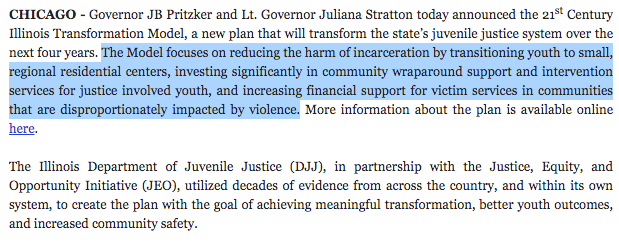Gov. Pritzker and Lt. Gov. Stratton will make an announcement on juvenile justice at an 11 a.m. press conference. I& #39;ll live tweet.
Follow for updates and let me know if you have questions.
Latest coronavirus update: https://blockclubchicago.org/2020/07/30/illinois-sees-highest-number-of-new-coronavirus-cases-in-2-months-as-state-hits-danger-point-pritzker-says/">https://blockclubchicago.org/2020/07/3...
Follow for updates and let me know if you have questions.
Latest coronavirus update: https://blockclubchicago.org/2020/07/30/illinois-sees-highest-number-of-new-coronavirus-cases-in-2-months-as-state-hits-danger-point-pritzker-says/">https://blockclubchicago.org/2020/07/3...
Pritzker and Stratton have a plan to "transform" the juvenile justice system in Illinois, investing more in communities and and "transitioning youth to small, regional residential centers."
Stratton: For more than a century, kids have been sent to large facilities. "But we know that evidence shows that warehousing children in these facilities have serious and lifelong negative consequences."
Stratton: "When we ask them what they want, they say, & #39;Closer.& #39; We know that too many of our youth, mostly Black and Brown, are being housed hundreds of miles" from their homes and communities & it& #39;s hard for families to visit them.
Stratton: "We cannot continue to be a country that criminalizes the children that need the most help."
Stratton: "It is time for a change to keep more young people out of the system."
Stratton: "Illinois has been a leader before in juvenile justice. ... And we will be leaders against by creating" a model of "smaller, community-based options for youth. The winds of change are beginning to blow, and a new wave of reform and & #39;good trouble& #39; is gathering."
Pritzker: "Our criminal justice system is too punitive and it& #39;s ineffective at fulfilling its purpose: Keeping Illinois families safe."
Pritzker: Juvenile justice systems were built on an antiquated theory of juvenile detention.
Pritzker: They exacerbate trauma, interfere with their familial relationships and create a culture of instability and violence.
Pritzker: The system sends a disproportionate number of young people of color into the system. Black kids, who make up 15% of Illinois& #39; youth population, make up more than 70% of the kids in DJJ facilities.
Pritzker: They& #39;ll increase financial support for victim services, especially in communities disproportionately impacted by violence.
Pritzker: "Here in Illinois, we& #39;ll be working directly with youth and families who have been impacted by the system ... ."
Pritzker: His administration has reduce juvenile detention. there were 282 kids detained when he took officer, but 97 as of June 30.
A man says he was charged as an adult for a crime he committed when he was 15. Eventually, he was treated as a juvenile. "I served 5 years in three different state youth prisons, most of them very far from my family."
He says he worked with the YAPP program to get support. He applied to NIU and got accepted. YAPP helped him get work. "With Omar& #39;s encouragement, I have done a lot of things, and I am proud to say I am working to stop re-incarceration of youth." He& #39;s also trying to avoid ...
being re-incarcerated himself. "... I want to help and stop re-incarceration by youth."
Speaker: "When it comes to changing young lives for the better, love, nurturing and connection work better than fear, loathing and isolation."
Speaker: "The plan for transformation relies on renovating existing properties, some of which have been going to waste for years ... . The result will be a 21st century juvenile justice system for Illinois, a model that puts state resources to better use and produces better ...
"results for everyone."
Director Heidi Mueller of juvenile justice department: Facilities are largely spread within northern and southern Illinois, with nothing in central Illinois. They need to invest in placements in central Illinois so kids can stay closer to their families.
Pritzker asked about NIMBYs who might not want centers in their areas: "I do not have those concerns. This is the right way to run a juvenile system, to assist the families, to assist these children. We& #39;re gonna get better outcomes. The results here are about public safety."
Mueller: "An exciting thing about this transformation is that unlike maybe some similar moves in the past or in other places, we have an opportunity here in Illinois to really do it the right way."
Mueller: Traditionally, success in juvenile justice has been measured by recidivism — the percentage of kids returning to the system within three years. They do measure that and care about that. "But I think that we miss the boat if we don& #39;t think about other positive ...
"outcomes, like education, like going to NIU, like having a job, like stability in housing, being able to take care of yourself and have the skills to live independently. Those are also measures of success that we really care about and this model will help us achieve."
Pritzker on Madigan refusing to resign: "He continues to have unanswered questions hanging out there." He needs to step up and answer those questions.

 Read on Twitter
Read on Twitter


